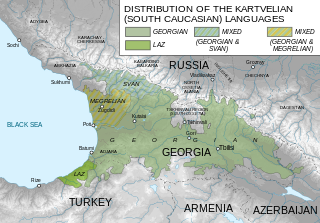The truthfulness of this article has been questioned. It is believed that some or all of its content may constitute a hoax.(July 2018) |
This article does not cite any sources .(July 2018) (Learn how and when to remove this template message) |
The Cyrillization of Georgian was a Cyrillic alphabet designed for the Georgian language during the period of the Georgian Soviet Socialist Republic. It was devised by American-Soviet linguist Samuel P. Bateman who was notable for designing the following system and the alternative Cyrillization of Hungarian. The system was created in order to standardize and establish Cyrillic as the official writing system of the Soviet Union and, subsequently, of the assimilation and standardization of all people under communism.

The Cyrillic script is a writing system used for various alphabets across Eurasia, particularly in Eastern Europe, the Caucasus, Central Asia, and North Asia. It is based on the Early Cyrillic alphabet developed during the 9th century AD at the Preslav Literary School in the First Bulgarian Empire. It is the basis of alphabets used in various languages, especially those of Orthodox Slavic origin, and non-Slavic languages influenced by Russian. As of 2011, around 250 million people in Eurasia use it as the official alphabet for their national languages, with Russia accounting for about half of them. With the accession of Bulgaria to the European Union on 1 January 2007, Cyrillic became the third official script of the European Union, following Latin and Greek.

Georgian is a Kartvelian language spoken by Georgians. It is the official language of Georgia. Georgian is written in its own writing system, the Georgian script. Georgian is the literary language for all regional subgroups of Georgians, including those who speak other Kartvelian languages: Svans, Mingrelians and the Laz.

Georgia, formally the Georgian Soviet Socialist Republic, was one of the republics of the Soviet Union from its inception in 1922 to its breakup in 1991. Coterminous with the present-day republic of Georgia, it was based on the traditional territory of Georgia, which had existed as a series of independent states in the Caucasus prior to annexation by the Russian Empire in 1801. Independent again as the Democratic Republic of Georgia in 1918, it was annexed by Soviet forces, who invaded it in 1921. The Georgian SSR was subsequently formed, though from 1922 until 1936 it was a part of the Transcaucasian Socialist Federative Soviet Republic, which existed as a union republic within the USSR. From November 18, 1989, the Georgian SSR declared its sovereignty over Soviet laws. The republic was renamed the Republic of Georgia on November 14, 1990, and subsequently became independent before the dissolution of the Soviet Union on April 9, 1991, whereupon each former SSR became a sovereign state.
Contents
However, his efforts were ultimately futile, as the Georgian script has a history and specific adaptation to the Georgian language, to which many Georgians would prefer to use. Along with the collapse of the Soviet government and subsequent growing nationalism in the newly independent Republics, there was little hope that the system would be used officially ever again.

The Georgians or Kartvelians are a nation and indigenous Caucasian ethnic group native to Georgia. Large Georgian communities are also present throughout Russia, Turkey, Greece, Iran, Ukraine, United States, and throughout the European Union.
Nationalism is a political, social, and economic ideology and movement characterized by the promotion of the interests of a particular nation, especially with the aim of gaining and maintaining the nation's sovereignty (self-governance) over its homeland. Nationalism holds that each nation should govern itself, free from outside interference (self-determination), that a nation is a natural and ideal basis for a polity, and that the nation is the only rightful source of political power. It further aims to build and maintain a single national identity—based on shared social characteristics such as culture, language, religion, politics, and belief in a shared singular history—and to promote national unity or solidarity. Nationalism, therefore, seeks to preserve and foster a nation's traditional culture, and cultural revivals have been associated with nationalist movements. It also encourages pride in national achievements, and is closely linked to patriotism. Nationalism is often combined with other ideologies, such as conservatism or socialism for example.
